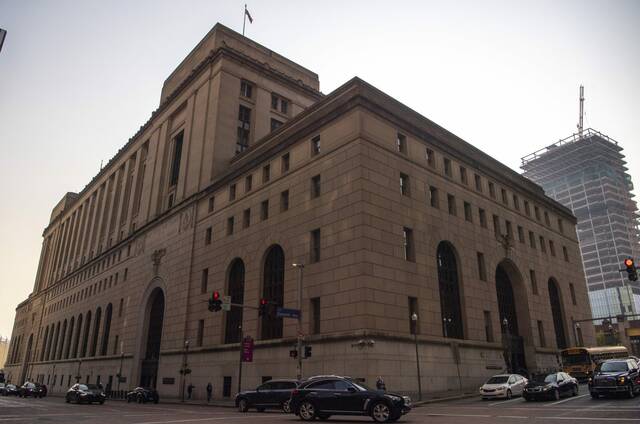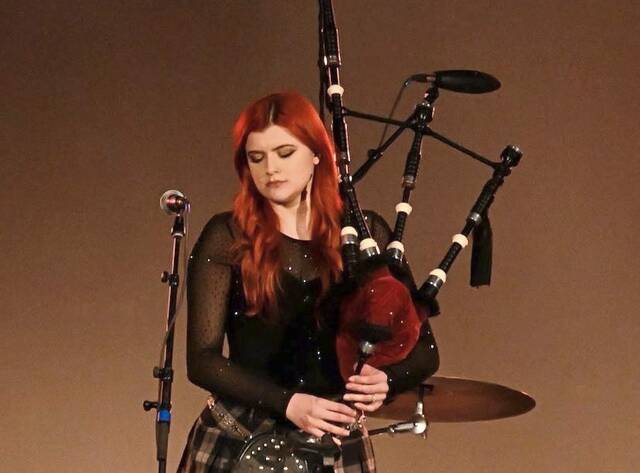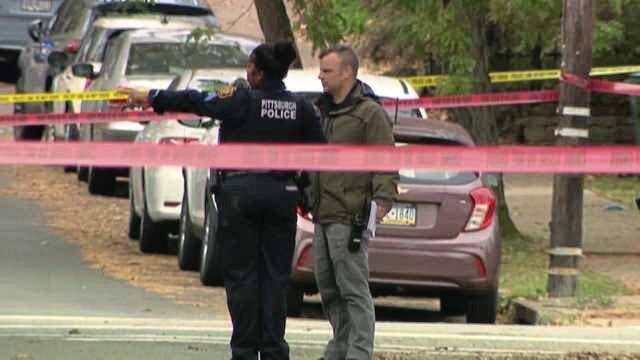On the morning of Oct. 27, 2018, the three congregations that met at the Tree of Life synagogue planned to focus on a lesson from the book of Genesis in the Torah — welcoming the stranger.
As they prepared for that lesson, an imperative in the Jewish faith, a stranger entered their building.
“That stranger did not come to pray. That stranger did not come to worship. That stranger came to kill,” U.S. Department of Justice criminal section attorney Mary Hahn told jurors Thursday during her closing argument in a Pittsburgh federal courtroom.
Robert Bowers was that stranger, Hahn said.
He entered the Squirrel Hill synagogue that had stood as a place of worship, fellowship and joy for more than seven decades and took all of it away because of his virulent hatred for Jews, the prosecutor said.
“Hold this defendant accountable for the worshippers who survived and told you what happened, and hold him accountable for those who could not testify,” Hahn said.
“Joyce Fienberg.
“Richard Gottfried.
“Rose Mallinger.
“Jerry Rabinowitz.
“Cecil Rosenthal.
“David Rosenthal.
“Bernice Simon.
“Sylvan Simon.
“Daniel Stein.
“Melvin Wax.
“Irving Younger.”
Hahn, an attorney focused on civil rights litigation for the Justice Department in Washington, D.C., delivered the government’s closing argument in the capital case against Bowers.
He is charged with 63 counts, including that he killed the victims because they were Jewish.
The defense, which from the outset admitted Bowers’ committed the attack that day, said that he was driven not by religion but by his hatred of immigrants — a claim they repeated Thursday in their closing.
“He was motivated by the nonsensical, irrational thought … that his actions would prevent genocide or stop immigrants,” said Assistant Federal Public Defender Elisa Long.
The jurors, seven women and five men, left the fifth-floor courtroom about 2:30 p.m. to begin deliberating. They were released before 5 p.m. and will return Friday morning.
Shortly before the jury filed into the deliberation room, members of the prosecution team rolled three large silver carts carrying all of the government’s exhibits, all stacked in boxes and evidence bags, into the courtroom.
The jurors will have access to them — bullets and vests, pictures and fragments — while they deliberate.
During her closing argument, Hahn spoke for nearly 90 minutes, recounting Bowers’ path through the synagogue in often horrific detail that was punctuated with 911 calls, police radio traffic and images.
“In just eight minutes, he hunted down and killed 11 people, half of the people in the building,” she said.
Using the words “hunted,” “cold and calculated” and “deliberate,” Hahn described for the jurors the defendant’s path through the building after he entered through a large, plate-glass window that he shot out in the front of the synagogue.
He fired almost 100 rounds and reloaded his AR-15 at least twice.
“He walked twice through the mezzanine. He walked twice through the blood and through the carnage and the bodies he left there,” Hahn said.
She referenced each victim, the wounds they suffered and where, ultimately, their bodies were found.
“You know how he hunted the victims in the synagogue. You know how he shot each of his victims. You know how he pursued congregants as they tried to save the life of others,” Hahn said. “You know how he murdered congregants still wearing their prayer shawls and clutching their prayer books.”
The prosecutor explained in detail the elements necessary to find Bowers, who sat at counsel table quietly reading and passing notes to his attorney during the government’s closing, guilty of each of the 63 counts and how the government had overwhelmingly proved each one.
Among them, Hahn said, are the counts that Bowers killed the victims to interfere in their faith.
“In this country, we all have the right of religious freedom,” she said. “Every person is allowed to pray in their chosen house of worship. No one is allowed to enter a synagogue and stop a person from saying their prayers.”
Throughout her closing, Hahn told the jury that Bowers could have stopped at so many points that morning — before he entered the synagogue, before he started shooting, after he killed the first of the victims, after he killed the last of the victims, before he shot responding Pittsburgh police officers.
But he didn’t.
“The defendant stopped not because he had a change of heart, not because he felt remorse, but because he ran out of ammunition,” she said.
Then, when he was done, Hahn continued, Bowers boasted to police about why he did it.
“He told them Jews needed to be killed,” she said. “This defendant’s hatred of Jews runs deep and is long-standing.”
Ten months before he committed the attack, Bowers created an account on the far-right social media website Gab.com, where he posted and reposted angry, hate-filled messages about Jews to nearly 400 followers.
They included images of ovens, references to the Holocaust and repeatedly called for violence.
“He welcomed others to learn from him, unite with him in his hatred of Jews,” Hahn said. “The defendant is dedicated to the eradication of Jews and the Jewish faith.
“He was not a passive user on Gab.”
Hahn urged the jurors, after deliberations begin, to review the posts to understand the depths of Bowers’ beliefs.
“He chose to go into the synagogue. He chose to kill. He chose to stop these Jewish worshippers from engaging in their prayers,” she said. “The defendant left in his wake an enormous toll of death and destruction.
“He hunted down elderly congregants, people who needed canes, hearing aids, and executed them in their house of worship because they were Jewish.”
Defense attorney Elisa Long began her closing argument Thursday afternoon conceding to the jury that her client entered the synagogue that morning “loaded with an AR-15 and shot every person he saw.
“We told you we would offer no excuse and no justification for that, and we have not done so,” she said.
But, Long continued, they were asking the jurors to analyze each criminal count and each element of each count to determine whether Bowers’ goal that day was specifically to interfere with the victims’ religion.
While Bowers’ actions that day did obstruct the victims’ worship, she said, that was not his primary motivation. Instead, it was to go to the space used by Dor Hadash, which was an active partner of the refugee resettlement group HIAS, the Hebrew Immigrant Aid Society.
“I know some of you are sitting there thinking, ‘Why on earth should we care? Why on earth should we care if it was to stop religious services or to stop people from assisting in the resettlement of refugees?’”
Because, Long continued, “It is vitally important to not convict on acts he did not commit.”
Long acknowledged her client’s Gab posts, and the hateful ideas he spewed there.
While they had “no basis in truth or in reality,” she said, “they do give us some insight into Mr. Bowers’ reality — no matter how distorted that reality is.”
The posts, Long said, showed his state of mind.
“Mr. Bowers’ sense of urgency increased,” she said. “He felt like he needed to act. He felt like he needed to act right away to prevent, in his words, the slaughter of his people.”
She highlighted for the jurors a number of Bowers’ posts that referenced HIAS, calling immigrants “invaders,” and his belief that they were coming to this country and killing white people. She also referenced his statements to the police as he was taken into custody that morning, during which he said, “They are killing our kids. These people are committing genocide on my people.
“I had to do this.”
“What Mr. Bowers’ statements make clear, he needed to kill Jews who supported HIAS,” Long said. “None of this makes any sense. None of this is true.
“But it’s what Mr. Bowers believed to be true.”
Long told the jurors that they have not received much information about her client. He was a 46-year-old man who lived alone in a neat and tidy apartment in Baldwin. He was fascinated with computers and had an interest in guns.
“How and why did this man, who lived a solitary and law-abiding life, wreak the havoc that he did?” she asked. “In the months and weeks leading up (to the crime), Mr. Bowers spent a lot of time alone absorbing all kinds of vile, extremist content.”
After Long concluded her 19-minute closing argument, U.S. Attorney Eric Olshan, who was sworn in on Monday, had the last word with 20 minutes of rebuttal.
As he began, Olshan spoke loudly.
“That man, Robert Bowers,” he began, pointing dramatically at the defendant dressed in a sweater like every other day of trial, “went into the Tree of Life synagogue, where three congregations — not just Dor Hadash — were worshipping.”
He immediately set out to counter the defense argument that Bowers’ was targeting Dor Hadash that day, calling that argument “absurd” and noting that Bowers didn’t target a refugee resettlement meeting or the HIAS office in Maryland.
“He focused on any Jew he could find to kill and try to kill,” Olshan said. “You don’t have to conclude hatred of Jews was the only reason, just the determinative one.”
Olshan stressed that “common sense” dictated that a crime that takes place in a synagogue — a house of worship — is a crime based on religious beliefs.
“He killed and attempted to kill people wearing yarmulkes, wrapped in prayer shawls, people holding prayer books,” Olshan said.
He then held up for the jury two evidence bags that contained the two torn pieces of Younger’s black yarmulke, destroyed by gunfire.
“This torn yarmulke is a witness to what the defendant did that day,” Olshan said. “You do have the power to do justice here in this court of law.
“The only justice is a verdict of guilty on every one of those 63 counts.”
The court session Thursday morning began with U.S. District Judge Robert J. Colville giving the jurors lengthy instruction on the law.
For nearly 90 minutes, Colville read from a 72-page document covering topics from burden of proof to reasonable doubt to presumption of innocence, witness credibility, expert testimony and the right of the defendant not to testify.
Colville recounted each of the 63 counts and then explained the elements the government must prove for the jurors to return a guilty verdict on each of them.
He read aloud each victim’s name for each count against Bowers.
He read the name of each police officer who was injured: officers Daniel Mead, John Persin and Michael Smidga, and SWAT officers Anthony Burke and Timothy Matson.
He read the names of those injured, but not killed: Dan Leger and Andrea Wedner.
And he read the names of survivors from the shooting who Bowers did not injure: Carol Black, Joe Charny, Martin Gaynor, Audrey Glickman, Rabbi Hazzan Jeffrey Myers, Jonathan Perlman, Stephen Weiss and Barry Werber.








